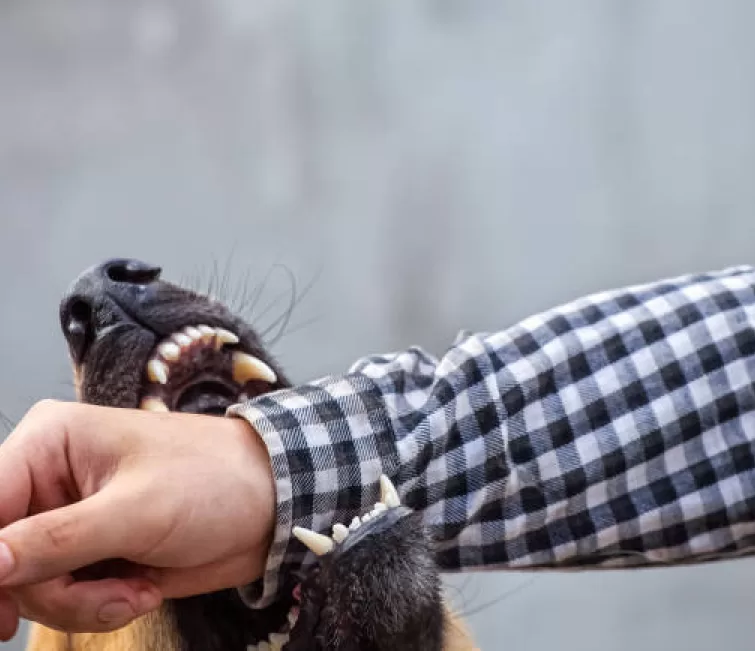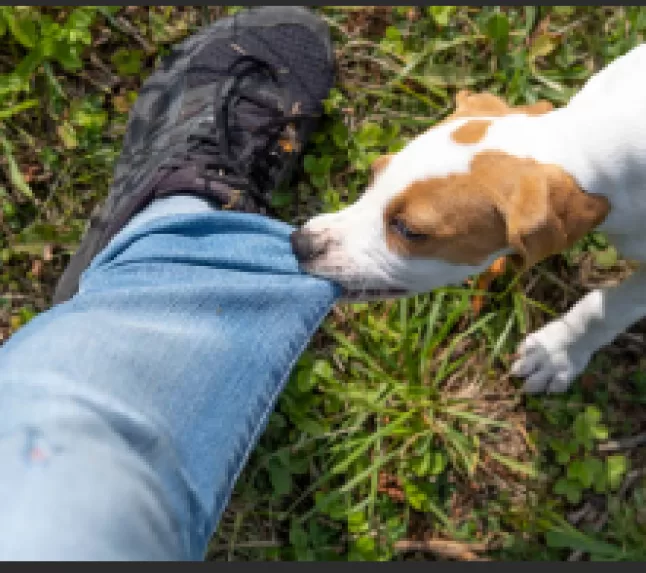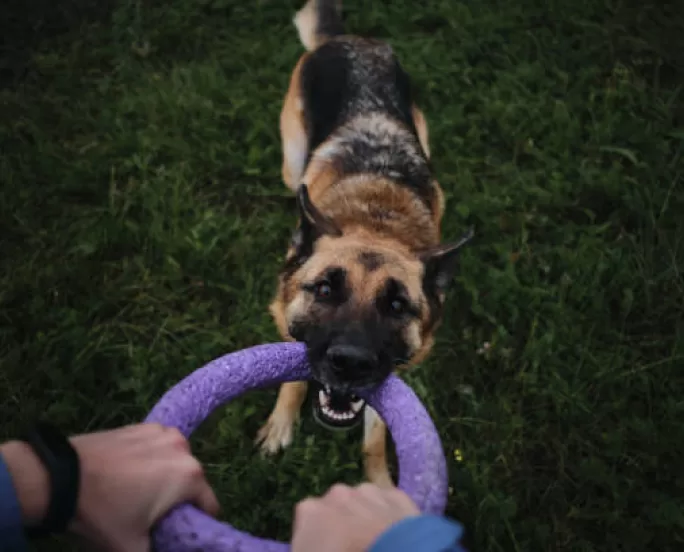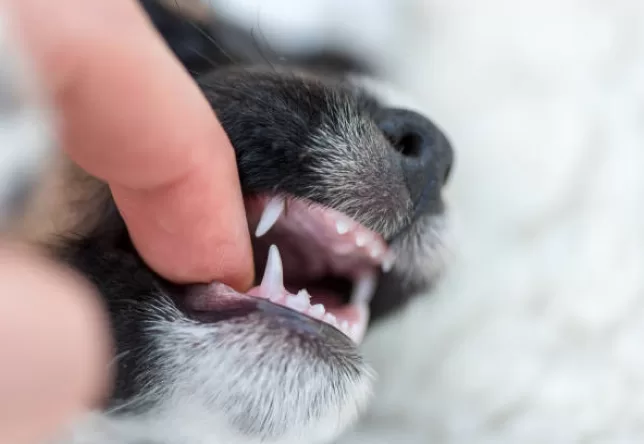Attorney:
Dog Bite
Imagine it was a day like any other. You were out for a stroll in your neighborhood when out of nowhere, an unleashed dog charged towards you, leaving you with painful injuries and a traumatic experience. In the chaotic aftermath, medical bills pile up, and the owner refuses to accept responsibility. You’re feeling lost and overwhelmed.
That’s where Accident Medical Group comes in. We are a team of dedicated legal professionals with a wealth of experience in dog bite cases. We stand by your side, fighting relentlessly for your rights, ensuring that the negligent party is held accountable and you receive the compensation you deserve.
What Floridians Should Know About Dog Bite Accidents
In Florida, understanding the legal framework surrounding dog bites is vital for both dog owners and potential victims. The state’s laws concerning dog bites hold certain implications for all parties involved, and being informed can make a significant difference when such an unfortunate event occurs. In the following section, we delve into key aspects that Floridians should be aware of when it comes to dog bites.

Florida's Dog Bite Statute
Florida operates under a strict liability law for dog bites. This means that a dog owner is liable if their dog bites someone, regardless of whether the dog has bitten anyone before or whether the owner was aware of the dog’s viciousness. The victim does not need to prove negligence on the part of the dog owner.
Comparative Negligence
In certain situations, the dog bite victim’s behavior could impact the amount of damages they’re able to recover. Florida follows a “comparative negligence” rule in dog bite cases, which means that if the victim’s actions contributed to the attack, their compensation might be reduced by a corresponding amount.
Statute of Limitations
In Florida, a dog bite victim has four years from the date of the bite to file a lawsuit in Florida’s civil courts. If you don’t file your case within this time period, you may lose your right to compensation.
Remember, it’s essential to seek legal advice from an experienced dog bite attorney to navigate these complexities and secure the justice you deserve.
Landlord Liability
In Florida, a landlord could be held liable for injuries by a tenant’s dog if they knew the dog was dangerous and didn’t take measures to ensure the safety of other tenants.
Homeowner’s Insurance and Dog Bites
Many homeowner’s insurance policies in Florida cover dog bite liability legal expenses, up to the liability limits of the policy. However, once a dog has bitten someone, your insurance rates may go up or the dog may be excluded from coverage.
The Laws Surrounding Dog Bites That You Should Be Aware Of
Understanding the laws surrounding dog bites is paramount to ensure your rights are protected, whether you’re a pet owner or a victim. Numerous legislations are in place to regulate this area, and it’s crucial to navigate these intricacies accurately. Let’s explore some of the most significant dog bite laws that you should be cognizant of, to help prevent unfortunate incidents, or respond effectively when they occur.
One Bite Rule
In some states, the so-called “One Bite Rule” applies. This law asserts that a dog owner is not liable for the first bite the canine inflicts. However, after the initial bite, the owner is expected to be aware of the dog’s potentially dangerous behavior, and consequently, can be held liable for any subsequent bites. It’s essential to understand that this rule does not apply in Florida, which operates under strict liability laws for dog bites.
Dangerous Dog Laws
A dog may be classified as “dangerous” or “vicious” under state or local law based on its behavior. Such classifications often follow a dog’s involvement in an attack or aggressive incident and can lead to more stringent regulations for the dog owner. These may include specific containment requirements, mandatory muzzling in public, or even removal of the dog from the owner’s custody.
Leash Laws
Leash laws are fundamental regulations that mandate the control of dogs in public spaces. These laws vary greatly among states, cities, and counties. In many regions, dogs are required to be on a leash at all times when outside the owner’s private property. Violation of leash laws can contribute to the owner’s liability in a dog bite case.
Reporting and Quarantine Laws
Most states have laws that require dog bites to be reported to specific local authorities, typically a local animal control agency. Many states also have rules mandating a quarantine period for a dog after it has bitten someone. This is primarily to rule out the possibility of rabies transmission. Failure to comply with these reporting and quarantine laws can result in penalties for the dog owner and may influence a dog bite liability case.
Remember, the laws detailed here are of general nature, and the specifics may vary based on your location. Always consult with a knowledgeable attorney to understand the laws applicable in your region.

What Happens When a Dog Bites Me?
When an unfortunate incident such as a dog bite occurs, it can leave you feeling anxious and overwhelmed. You might be unsure of what steps to take next and how to navigate the situation. However, knowing the immediate actions to take post-dog bite can be critical in protecting your rights and ensuring your well-being. Let’s discuss the following essential steps to adopt if you find yourself in this distressing scenario.

Seek Immediate Medical Attention
First and foremost, seek immediate medical attention. A dog’s mouth is a breeding ground for bacteria, and without prompt medical intervention, a bite can lead to severe infection. A healthcare professional will clean and dress your wound to prevent infection, and may also provide a tetanus shot if needed.
Identify the Dog and its Owner
If possible, identify the dog that bit you and its owner. This information is essential for later legal proceedings and for verifying the dog’s vaccination status, especially concerning rabies. If the dog is a stray or you cannot identify the owner, you may need to undergo additional medical treatments as a safety measure against rabies.
Document Everything
Document the incident in detail. This includes writing down the sequence of events leading up to the bite, taking photographs of your injuries, and retaining any clothing damaged in the attack. If there were any witnesses, obtain their contact information and accounts of the incident. This documentation will be crucial evidence if you decide to pursue a legal claim.
Report the Incident
It’s crucial to report the dog bite to local animal control authorities. This will initiate an investigation that could help your legal case, prevent future attacks, and potentially lead to the declaration of the dog as dangerous, which imposes stricter control measures on the dog and its owner.
Consult with a Dog Bite Lawyer
Lastly, consult with a specialized dog bite lawyer. Navigating the legal landscape of dog bite cases can be complex. A lawyer can provide guidance, help you understand your rights, and assist in pursuing a claim for damages, if applicable. They can also communicate with insurance companies on your behalf, helping to ensure you receive fair compensation.
My Dog Bite a Person. What Now?
Being on the receiving end of a dog bite incident can be distressing as a pet owner. Your first concern might be about the welfare of the person who was bitten, but you may also be worried about the potential legal implications and the well-being of your pet. It’s essential to handle such situations properly to ensure a fair and reasonable outcome. Let’s delve into important steps you, as a dog owner, should take if your dog bites someone.

Ensure the Victim's Safety
Firstly, it’s paramount to ensure the safety and well-being of the person bitten. Separate your dog from the individual and provide immediate assistance. This includes offering first aid supplies if available and encouraging the victim to seek professional medical help.
Contact Your Insurance Company
Next, contact your homeowner’s or renter’s insurance company to report the incident. Depending on the nature of the attack and your specific policy, insurance may cover some or all of the victim’s expenses related to the incident.
Exchange Contact Information
Once the immediate safety concerns are addressed, exchange contact information with the victim. This will facilitate communication, especially in terms of medical updates like the status of a rabies vaccination.
Consult with a Lawyer
Just as victims are advised to seek legal counsel, it’s wise for you as a dog owner to consult with a lawyer who specializes in dog bite cases. They can guide you through the legal landscape, defend your interests, and help ensure that all procedures are appropriately handled.
Report the Incident
It’s crucial that you report the incident to the relevant local authorities. This often includes your local animal control agency. Reporting the incident demonstrates your responsibility as a pet owner and ensures that the incident is documented officially.
Evaluate Your Dog's Behavior
In the aftermath of the incident, it’s important to evaluate your dog’s behavior and consider seeking professional advice. A certified dog behaviorist can assess your dog and provide recommendations for training or management strategies, which may prevent future incidents.
Steps to Take After an Accident Involving a Dog
Accidents involving dogs can occur unpredictably and can be distressing for all parties involved. The steps that are taken immediately following these incidents are crucial to ensuring the safety and wellbeing of the individuals and the animals involved, as well as to upholding the rights of those implicated. The following section outlines the necessary steps to follow after an accident with a dog, providing guidance on how to handle the situation effectively and responsibly.

Make Sure Everyone is Safe
The first step after a dog-related accident is to ensure the safety of all parties involved – humans and animals alike. This can involve providing first aid, moving away from a busy road, or separating hostile animals. In some cases, it might be necessary to call for emergency medical assistance.
Identify the Dog and Owner
As with dog bite incidents, identifying the dog and its owner is crucial. This information will be important for any potential legal proceedings and for verifying the dog’s health status.
Gather Evidence
Document the incident as thoroughly as possible. This includes taking pictures of the scene and any injuries, writing down what happened, and gathering the contact information of any witnesses. This evidence can be essential if legal action is taken later on.
Report the Incident
You should report the accident to the appropriate local authorities. This often means contacting animal control and potentially the police, depending on the nature of the incident.
Follow Up with Healthcare
Whether you’re a human victim or the owner of a dog involved in an accident, it’s important to follow up with healthcare providers. This might involve getting a check-up, updating your vaccination status, or scheduling a veterinary appointment for your pet.
Consult with a Lawyer
For both victims and pet owners, it can be beneficial to seek legal counsel following a dog-related accident. A lawyer can guide you through any legal processes, help you understand your rights, and assist in pursuing a claim for damages, if applicable.
Review and Learn
Finally, after all immediate follow-up actions are complete, it’s important to review what happened and learn from the incident. This might involve reassessing your dog’s training and behavior, making changes to your environment, or educating others about dog safety.

Recovering Compensation After a Dog Bites You
When a dog bite occurs, it can result in significant physical and emotional distress, often leading to substantial medical costs and, at times, loss of earnings. If you are the victim of a dog bite, you may be entitled to recover compensation for these and other related damages. This process, while it can seem daunting, is often necessary to ensure that you are not left to bear the burden of the incident on your own. Here, we will explore the steps that can be taken to seek fair compensation after a dog bite incident.
Understand the Laws in Your Area
The laws concerning dog bites vary by location, so it’s essential to understand the laws in your area. Some places operate under a ‘one-bite rule,’ where owners are only liable if they knew their dog was prone to biting. In contrast, other areas have ‘strict liability’ laws, which hold owners responsible regardless of the dog’s past behavior.
Document Everything
Start by documenting everything about the incident. This includes information about the dog, the owner, the location, and any witnesses. It also includes all medical records and expenses, pictures of injuries, and any other damages, like torn clothing or lost wages.
Seek Legal Advice
It’s often advisable to seek legal advice when seeking compensation after a dog bite. A lawyer who specializes in personal injury or dog bite cases can guide you through the process and help ensure you receive fair compensation.
Negotiate with the Insurance Company
Often, compensation will be sought from the dog owner’s homeowner’s or renter’s insurance. You, or your lawyer, may need to negotiate with the insurance company to arrive at a fair settlement.
Maintain Open Communication
After a dog bite incident and throughout the legal process, maintain open lines of communication with all parties involved. This includes the dog’s owner, any witnesses, your medical provider, your lawyer, and the insurance company. Keep them informed about your medical progress and any developments related to the case.
Keep A Record
Ensure you keep an organized record of all the documents, reports, medical bills, correspondence, and any other relevant information. This will be useful not only during the process of seeking compensation but also for any future needs.
Stay Updated With The Law
Laws regarding dog bites and personal injury claims can change. It’s crucial to stay informed about any changes in legislation that could affect your case.
Take Care of Your Mental Health
Experiencing a dog bite can be a traumatic event leading to psychological distress. Don’t ignore the emotional impact of the incident. Seek counselling or mental health support if necessary.
Dealing with Insurance After a Dog Bites You
Navigating insurance matters after a dog bite incident can often be a complex and challenging process. Understanding the intricacies of the insurance claims process, the role of the insurance companies, and your rights as a claimant, are all critical to ensuring you receive the compensation you deserve. In the following section, we delve into key considerations and steps to effectively deal with insurance companies after a dog bite.

Understand Your Insurance Policy
First, familiarize yourself with your insurance policy. Know what is covered and what is not. Policies can vary greatly in terms of what they cover in the event of a dog bite, so don’t assume that your policy covers everything. Review the terms and conditions and understand any limitations, exclusions, or requirements.
Report the Incident
As soon as you can after the incident, report it to your insurance company. This is crucial, as failure to report the incident promptly may give the insurer grounds to deny your claim. Be as detailed as possible when reporting the incident.
Cooperate with the Insurance Company
Once you’ve reported the incident, the insurance company will likely launch an investigation. Cooperate fully with the company’s representatives, providing any requested information or documents in a timely manner.
Keep Detailed Records
Throughout the process, keep detailed records of everything related to the incident and your claim. This includes medical bills, photos of injuries, correspondence with the insurance company, and any other relevant documents.
Consider Hiring a Lawyer
The insurance process can be complex, and having a legal professional on your side can be beneficial. Consider hiring a lawyer who specializes in personal injury or dog bite cases to guide you through the process.
Do Not Accept the First Offer
Don’t feel compelled to accept the first settlement offer from the insurance company. It’s not uncommon for the initial offer to be lower than what you may be entitled to. You have the right to negotiate the settlement, and a lawyer can help you with this.
Seek an Independent Assessment
Consider getting an independent assessment of your injuries and related costs if you feel the insurance company’s offer is too low. This could come from a medical professional or another insurance expert.
Prepare for Possible Legal Proceedings
In some cases, if an agreement cannot be reached, you may need to take legal action against the insurance company. Be prepared for this possibility and understand what it would entail. It’s crucial to remember that every dog bite case is unique, and the insurance process can be unpredictable. The important thing is to stay informed, organized, and patient throughout the process.

Incidents with Dogs Can Have Financial Consequences
A dog bite incident can have significant financial implications. Those affected may have to bear medical expenses, lost income due to inability to work, psychological therapy costs, and even legal fees. The financial burden can be daunting, particularly in severe cases where long-term medical treatment or therapy may be necessary. It’s important to understand these potential financial consequences and prepare for them as you navigate the aftermath of a dog bite. In the following points, we’ll delve into these potential costs in greater detail to give you a comprehensive understanding of the financial impact a dog bite can have.
Medical Expenses
One of the first and most immediate financial impacts of a dog bite is the cost of medical care. These expenses can range from minor treatments for superficial wounds to extensive medical procedures for severe injuries. Costs may include doctor visits, hospital stays, surgeries, medications, and physical therapy.
Loss of Income
If a dog bite results in an injury that prevents the victim from working, either temporarily or permanently, this could lead to a significant loss of income. The victim may be entitled to claim for lost wages as part of their compensation.
Psychological Therapy Costs
The trauma of a dog bite incident can have long-lasting psychological effects. Victims may require psychological therapy or counseling to deal with issues such as post-traumatic stress disorder (PTSD), anxiety, or depression. These therapy sessions can add up to substantial costs over time.
Long-Term Care Costs
In severe cases, a dog bite may result in long-term, or even permanent, disability requiring ongoing medical care or personal assistance. These long-term care costs can be a significant financial burden.
Legal Expenses
Pursuing a claim for a dog bite can involve various legal costs. These may include attorney’s fees, court costs, and expenses related to gathering evidence for the case. While some of these costs may be recoverable as part of the claim, others may have to be borne by the victim.
Insurance Premiums
Following a dog bite claim, the victim’s insurance premiums may increase. This is another potential financial consequence that should be taken into account.
How Can a Dog Bite Lawyer Help Me?
In the wake of a dog bite incident, you may find yourself grappling with a complex legal scenario, and hiring an experienced dog bite lawyer can offer invaluable assistance. These professionals understand the intricacies of dog bite laws and can provide the guidance and advocacy you need to pursue a claim successfully. In the subsequent points, we’ll delve into the varied ways a skilled dog bite lawyer can help ease your journey towards rightful compensation.

Expert Legal Advice
At AMG, our experienced team of dog bite lawyers can provide expert legal advice to guide you through the complexities of your case. We understand the intricacies of dog bite laws and can help you navigate the legal process, ensuring you’re well-informed at every stage.
Comprehensive Case Evaluation
Our lawyers conduct a comprehensive evaluation of your case, taking into account all the relevant factors. This includes the circumstances of the incident, the severity of your injuries, the financial impact, and any potential negligence on part of the dog owner.
Negotiating with Insurance Companies
Dealing with insurance companies can be daunting. Our lawyers are skilled negotiators who can deal with the insurance companies on your behalf. We aim to secure the maximum compensation possible, and we won’t hesitate to challenge any low-ball settlement offers.
Legal Representation in Court
If your case goes to court, you can count on AMG for robust legal representation. Our lawyers are seasoned courtroom advocates who will passionately argue your case, striving to secure the justice you deserve.
No Upfront Fees
We understand that a dog bite incident can cause financial stress. At AMG, we operate on a contingency fee basis, which means you don’t pay any upfront fees. We only get paid if we win your case, reducing your financial burden.

Contact (Contact (305)-264-4357 About Dog Bite
Don’t let the consequences of a Dog bite overwhelm you. Reach out to our dedicated team at (305) AMG-HELP today. We’re committed to helping you navigate the challenges post-accident, and ensuring you receive the compensation you deserve. We stand by your side, advocating for your rights and providing the legal expertise you need during this difficult time. Don’t wait – the path to recovery and financial stability starts with a single call.


